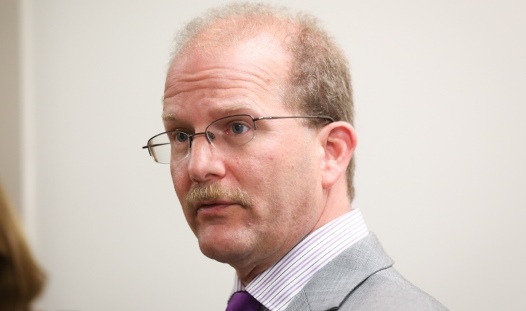
The number of opioid-related deaths in Michigan has hit an all-time high, requiring the resources of the state's three major research universities and one of its largest health systems to tackle the problem.
Under a two-year, $1.5 million grant, Wayne State University, Michigan State University, the University of Michigan, and Grand Rapids-based Spectrum Health will train more physicians to become addiction medicine specialists by streamlining the certification process.
Fewer than 200 physicians in Michigan are certified in addiction medicine or addiction psychiatry, and there's only one specialist in the entire Upper Peninsula.
"That's not enough to meet demand," said Kelly Strutz, Ph.D., an epidemiologist and assistant professor in the MSU College of Human Medicine. "The goal is for us to be able to reach the entire state and train more physicians."
The grant is supported by the U.S. Substance Abuse and Mental Health Services Administration through the Michigan Department of Health and Human Services opioid response fund.
"Due to recent policy changes that prescribers have followed, deaths related to prescription painkillers have shown a modest decrease," said Wayne State Professor of Psychiatry and Behavioral Neurosciences Mark Greenwald. "Yet despite this positive trend, deaths from heroin and synthetic opioids have risen. Cocaine and sedative use, along with opioids, also complicate the picture. Our training curriculum will be responsive to these changing tides."
Cara Poland, M.D., a Spectrum Health Medical Group physician and certified addiction medicine specialist, said most doctors receive fewer than five hours of addiction training in medical school.
"We are in an opioid epidemic, and by some national measures, Michigan is in the top 10," said Dr. Poland, an assistant professor at MSU. "We literally don't have enough doctors equipped to deal with this epidemic."
Dr. Poland and Dr. Strutz are leading the program, called Michigan CARES, or Collaborative Addiction Resources and Education System, in cooperation Dr. Greenwald, who leads Wayne State's Division of Substance Abuse Research, and Edward Jouney, D.O., clinical instructor and program director for the U of M Addiction Psychiatry Fellowship Program.
Certification in a medical specialty is typically achieved through a fellowship program. However, new specialties offer a shorter timeframe in which physicians can gain more experience and fulfill certification requirements without a fellowship, known as a practice pathway.
Due to the urgency of Michigan's problem, Michigan CARES will assist physicians in fulfilling the requirements through online courses, clinical experiences and leadership opportunities.
"This epidemic does not discriminate, and Michiganders from all walks of life have been affected in one way or another," Dr. Jouney said. "Michigan is a state of phenomenal resources, and when presented with a challenge, the health care professionals in this state will rise to the occasion."
Opioid misuse, which includes prescription painkillers, heroin, fentanyl and other synthetic drugs, was blamed for 49,000 deaths nationwide in 2017. This prompted the U.S. Centers for Disease Control and Prevention to lower the country's average life expectancy. Michigan recorded nearly 2,000 opioid-related deaths in 2017, according to the Michigan Department of Health and Human Services.
The team hopes to enroll physicians in the coming weeks. While the motivation focuses on opioids, physicians will receive skills to treat other forms of addiction, including methamphetamines, stimulants and alcohol.